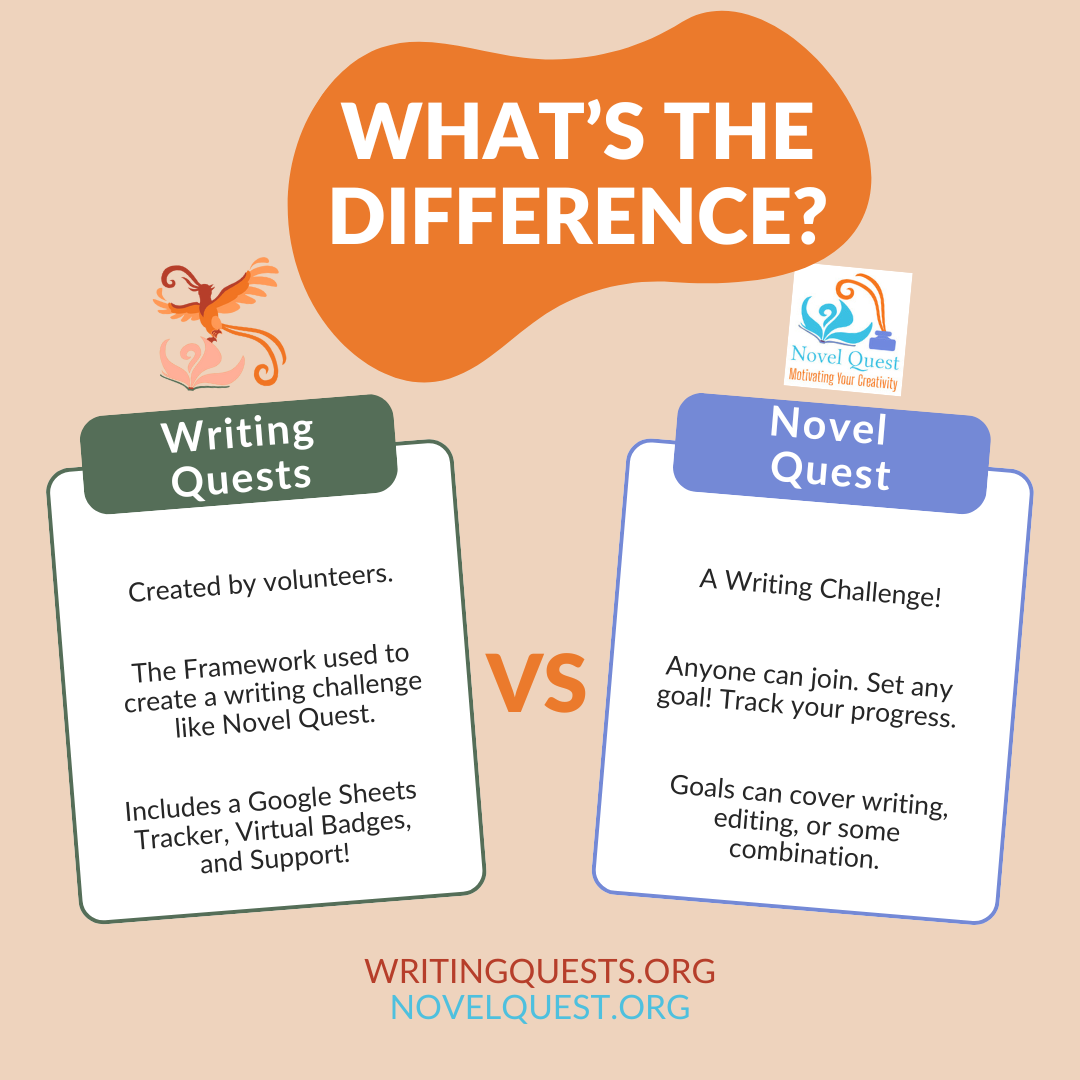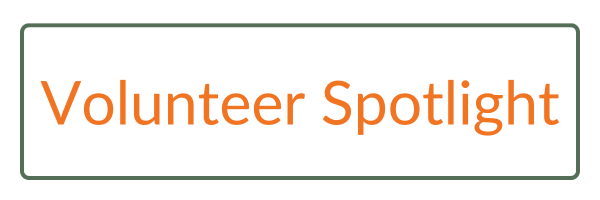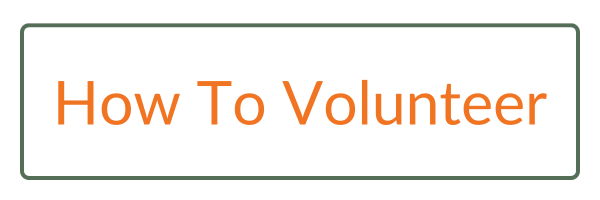What's the Difference- Writing Quest vs Novel Quest?
This week, we are diving into Writing Quests vs Novel Quest, How to’s (for QGs) Use Sprints, Tips for Planners & Pantsers, Prompts and more.
Writing Quests is a writing community that strives to connect writers with writing challenges to foster a continued flow of words for your preferred genre.
What’s the Difference- Writing Quests vs Novel Quest?
Ever wanted to write a novel and you found yourself needing motivation and the support of fellow writers? Writing challenges can be just the ticket, but what can you do if your writing group needs to organize and run its own writing challenge?
Writing Quests is an association and an open project created primarily by former Municipal Liaison volunteers for NaNoWriMo who are collaborating to fill in the gap left when they decided to leave NaNoWriMo behind after its leadership changed. Together, we have created the start of a set of resources that should enable any group to host their own writing challenge (which we call a Quest).
One of the questions that any writing challenge host (which we call a Guide) faces is what to call their Quest. We have come up with a name that anyone can use for their Quest: Novel Quest. Novel Quest is an instance of a Quest that uses the Writing Quest framework. We initially created Novel Quest to help us determine if there were any parts of the Writing Quests Framework that had missed creating. Now groups wanting to set up their own writing challenge can do this with Novel Quest.
Some may wonder: what are the differences between NaNoWriMo and Novel Quest? NaNoWriMo rules are about writing 50,000 words of a novel in 30 days in November. While Novel Quest and the Writing Quest Framework can be used to support those doing NaNo, Novel Quest is more flexible:
Participants set their own writing and/or editing goals. Want to do 60K words in 30 days? 15K words written and 15 hours of editing? 50 hours of editing? All of these are valid Novel Quest goals. In NaNo, one would have to be a “rebel” to pursue one's own goals.
Want to do Novel Quest in October instead of November? This is fine—you can host a Novel Quest challenge in any month.
Novel Quest offers badges that are awarded based on % of the monthly goal achieved.
Novel Quest will offer a tracker to record progress and help with motivation.
Writers face many challenges. New writers may need extra motivation and support to complete a draft of their first novel. Novelists with a rough first draft may appreciate the same to go through the editing process. More experienced writers might be working on multiple writing projects, writing shorter fiction while editing other pieces. Novel Quest is structured to be used by all of these writers.
Stories and storytellers are important. Come join us by telling yours.
Volunteer Spotlight- Jessica aka DancinLibrarian
Writing
I have worked as a journalist and on press releases. I enjoy writing as a hobby and being a novelist.
Hobbies
When I am not writing, I can be found playing Dungeons & Dragons and DMing as well as gaming on the computer.
WQ Work
I am on the Marketing & Branding Committee, the Education Committee, and the Newsletter subcommittee.
Personal Quest
My personal quest is to inspire writers and readers!
How to volunteer/contribute
We have three different ways to get involved:
Quest Guides- The people who host the Writing Quests are called Quest Guides. They help creatives through the process of setting goals, prepping for the quests, and providing encouragement during the event. Click on Get Involved> The Framework to get started.
Participants- Anyone can participate, even if you are not a writer. Visit our website to find a participating group near you.
Volunteers- Writing Quests is an all-volunteer organization. If you want to volunteer, please email info@writingquests.org and let us know your experience and if applicable, what you want to help with.
We actively need people with technical skills in website design/coding (our writingquests.org site is created with Hugo) and web application design/development (e.g., using Vue.js to create our rules generator or Laravel to work on a web-based progress tracker).
How to use Sprints
Writing a novel can sometimes feel like participating in a marathon. You have to pace yourself to make it to the end. But sometimes, you can put in extra bursts of speed and sprint to make progress. That works in writing, too.
Sprints can be fun alone or in a group! Try setting a timer. (If you’re using Discord, try Sprinto to keep track of time and word counts. https://sprintobot.com/ ) Everyone can use that time to quietly focus and write without distraction. A lot of groups like sprinting for 15 minute increments.
Last November, I got the lion’s share of my writing using my region’s sprints. It didn’t matter if it was at in-person events, Discord meet-ups, or just at home with my husband (who also writes) and our cat (who does not). It really helped me keep up my motivation during the whole month.
Short bursts of focus can be productive. And, if you’re having writer’s block during a sprint, it’s not a large amount of time to feel frustrated. Well spaced sprints can give you a moment to put it on the page, but then also get up and grab a drink. The shorter timeframe also narrows the scope of that moment of writing, so that instead of having to write, say a whole chapter, you can write a page and still be productive.
Sprints are a fun and useful activity to help you on your Novel Quest.
Planners & Pantsers or whatever you call ‘em.
When you start a writing challenge, do you know if you are a planner or a pantser? There is no correct way to write a first draft of a novel. And among famous, bestselling authors there are different approaches. Two of the most successful mystery novelists of all times, have opposite approaches. There are advantages and disadvantages to both, so let’s dive in and figure this out.
One of the most successful mystery novelists of the modern times is an ardent advocate of planning and outlining. James Patterson has written over 200 novels to date, and counting. 67 of them have been best sellers. He says in his Master Class, that he goes through many, many drafts of an outline. He uses this process to organize scenes. He actively encourages writers to think of their story in scenes. There are many potential scenes and the only way to know which ones work is to write them down and then organize them. He says once he gets an outline he’s happy with, the writing process goes much faster and he is more excited to write the book. He claims the need to re-write it is greatly diminished. So the more detailed the outline, the better the book will be in the end.
But this comes with a downside. Perhaps he doesn’t know how to connect his scenes together, or what will be in chapter 3. He just writes TBD and moves on. Because he revisits the missing parts in draft after draft, he can write the novel whenever he wants. So the fixed starting date of a writing challenge like Novel Quest can put pressure on the outline and lead to writer’s block.
It's good to know exactly what you’re writing next, but perhaps, when we are working at such an exhaustive speed it’s better to leave some creativity.
Pantsers on the other hand have a very loose approach to writing, keeping their ideas inside their head, and writing at a furious pace as the story comes to them in quick bursts. The spark is there, and they may write on a notecard a few ideas for characters or scenarios, but the beats of the novel aren’t planned. The best selling novelist of all time, in any language, in any genre wrote that way. Agatha Christie rarely planned anything in her novels. Her notebooks have been studied and there are a couple of books about them. Dr. John Curran, who wrote those books, has publicly stated his frustration at the lack of detail around some of the novels in her notebooks. There are loads of novels where there are simply no notes. We know this because there are notes in the notebooks for a novel, then it skips a novel or two, then notes for other novels. The notes are frequently cryptic, and are attempts to solve plot problems in her novels. They distinctly lack the structure to most of the notes.
Pantsers tend to write character driven narratives that grow organically from the previous plot point. It does require a bit more editing on the back end, but once a little seed is planted, a pantser can get it to grow to a mighty novel.
Which style of writing seems more like you? Remember, no matter how you write, planner, pantser, or somewhere in between, there is a best selling author who has tread the same ground as you. You are not alone.
Now a prompt: What is your main character’s misbelief about the world and what event lead to them believing it?
Upcoming events
Due to the amazing Alpha Testers, we have some changes to make to our Framework, so our Beta Testing has been moved to September.
In October, we will start prepping for November’s Novel Quest, a fun writing challenge run by Writing Quests. We will release templates for the challenge and include social media banners for writing groups and participants. More information to come as we get closer to the month.
Coming September:
Sep 7: Beta Testing Starts
Coming October:
Oct 1: Preptober for November’s Novel Quest Starts
Oct 15: Midpoint Touch Base
Coming November:
Nov 1: Novel Quest Begins!
Look for us online
Visit our website: www.writingquests.org
Find us on the social medias:
Twitter www.x.com/writingquests
Pinterest www.pinterest.com/WritingQuests/
Instagram www.instagram.com/writingquests
Facebook Group www.facebook.com/groups/writingquests
Youtube: https://www.youtube.com/channel/UCGNbZWYi4pTkENOYYLgtCvg
Volume 7















